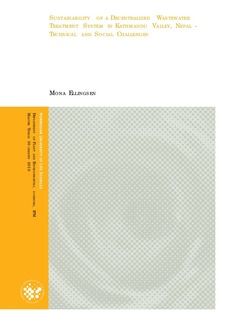| dc.description.abstract | In Southern Asia the proportion of the population without access to improved sanitation facilities (sanitation facilities that “ensure hygienic separation of human excreta from human contact”) is below 50 % (WHO & UNICEF 2010). In Nepal, a country where only 31 % of the population has access to improved sanitation facilities, and 52 % practice open defecation, the situation is severe. Because of this, a location in the Kathmandu Valley, Nepal, was chosen for a case study for this thesis. The aim of this thesis is to give an overview of the condition of the treatment system at this location, and analyze the factors affecting sustainability, both from a technical and a social aspect.
Various approaches are used in the attempts to improve the sanitation challenges, but not all are equally sustainable as the approaches to implementation and choice of facilities are diverse, and not always adjusted to local conditions. Examples of site-specific factors to consider when choosing an approach to implementation might be: economics, water availability, local culture, management, operation and maintenance and so on.
The system studied in this thesis is a decentralized wastewater treatment system consisting of an ABR, two parallel horizontal flow constructed wetlands, and finally two parallel vertical flow constructed wetlands. In the constructed wetland the wastewater is treated by naturally occurring processes. Examples of such processes are; settling and straining of suspended solids and organic material, nitrification and denitrification of ammonia, die-out and predation of microorganisms. Among the advantages of a constructed wetland are low requirement of skilled labor for operation and maintenance and low construction costs.
In order to identify the factors affecting the sustainability of a decentralized wastewater
treatment system in Nepal, several investigations concerning treatment efficiency, knowledge, operation and maintenance were carried out. The factors are, for simplicity, divided into technical and social factors. The technical investigations consisted of analyzing samples from
different stages in the treatment process; the samples were collected since startup of the system. The social investigations consisted of interviews with key persons connected to the system. The results from the technical investigations show that the treatment efficiency is fairly high, but
the effluent values are not according to neither Nepali nor EU standards. The treatment system is not being operated and maintained in the optimal way, and some simple improvements may give better treatment efficiency. From the interview it is clear that there is great potential of
improving knowledge and involvement of the user’s committee as well as the community. | no_NO |
